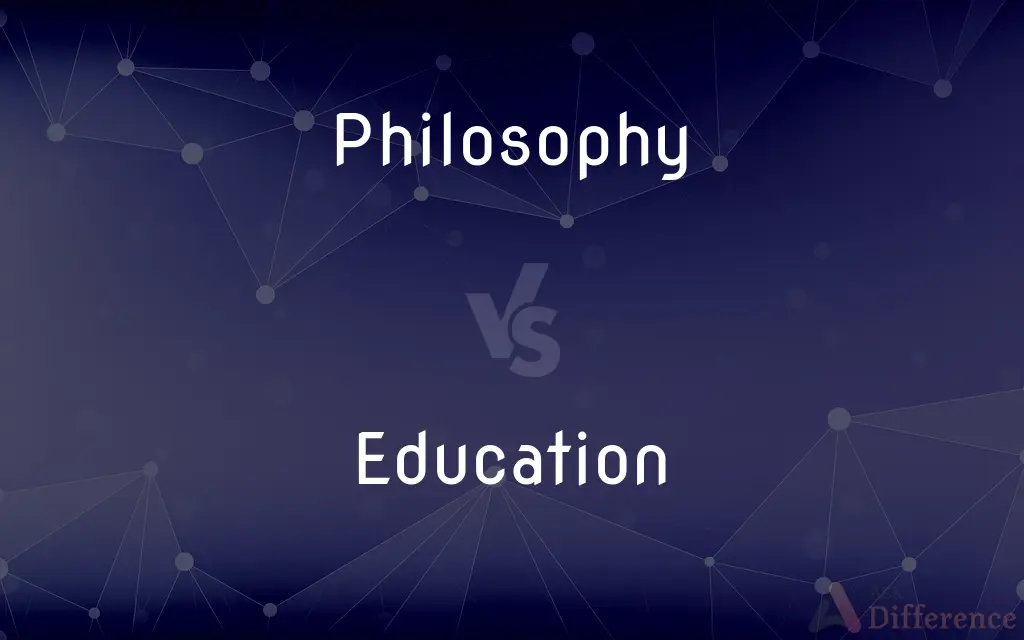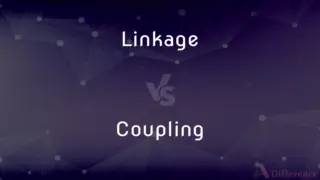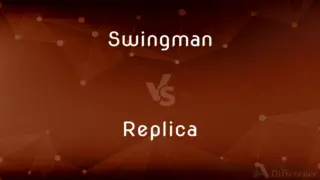Philosophy vs. Education — What's the Difference?
Edited by Tayyaba Rehman — By Fiza Rafique — Updated on March 14, 2024
Philosophy is the study of fundamental questions about existence, knowledge, values, and reason. Education is the process of facilitating learning, or the acquisition of knowledge, skills, values, beliefs, and habits.

Difference Between Philosophy and Education
Table of Contents
ADVERTISEMENT
Key Differences
Philosophy and education are interconnected yet distinct fields that explore human understanding and the transmission of knowledge. Philosophy delves into the theoretical underpinnings of reality, ethics, logic, and the mind, seeking to answer profound questions about life, the universe, and everything in between. It involves critical thinking, argumentation, and the systematic examination of fundamental concepts. Education, on the other hand, is concerned with the methodologies and practices of teaching and learning. It focuses on how knowledge, skills, and values are imparted and acquired, aiming to develop individuals’ abilities and understanding to their full potential.
While philosophy provides a broad framework for thinking about the nature of knowledge, truth, and values, education applies these philosophical principles to practical situations, shaping curricula, teaching methods, and educational policies. Philosophers might question the purpose of education, the nature of knowledge, and the ethics of teaching and learning, offering insights that can inform educational theory and practice. Conversely, educators implement strategies to convey knowledge and foster critical thinking, drawing upon philosophical theories to enhance teaching and learning experiences.
The relationship between philosophy and education is also evident in the field of philosophy of education, which directly applies philosophical analysis to educational questions. This subfield examines the goals of education, the role of teachers and students, and the content of education, bridging the gap between philosophical ideals and educational practice.
Education relies on philosophical concepts to establish goals and values within educational systems. For example, democratic societies might emphasize education that fosters critical thinking, civic responsibility, and individual freedom, reflecting philosophical ideals about democracy and individual rights. Philosophy, in turn, can be influenced by educational practices and the evolving needs of society, leading to new questions and theories about learning, knowledge, and human development.
Despite their differences, both philosophy and education share a commitment to understanding and improving the human condition. Philosophy seeks to uncover the principles that should guide our lives and societies, while education aims to transmit these principles and the accumulated knowledge of humanity to successive generations, promoting personal and societal growth.
ADVERTISEMENT
Comparison Chart
Definition
Study of fundamental questions about existence, knowledge, values.
Process of facilitating learning and acquisition of knowledge, skills.
Focus
Theoretical exploration of abstract concepts.
Practical application of teaching and learning methods.
Purpose
To understand the nature of reality, ethics, and knowledge.
To develop individuals’ abilities and knowledge for personal and societal benefit.
Methods
Critical thinking, argumentation, systematic analysis.
Teaching methodologies, pedagogical theories, practical exercises.
Outcome
Insights into the principles governing life and the universe.
Knowledgeable, skilled individuals capable of contributing to society.
Compare with Definitions
Philosophy
The investigation of fundamental truths and principles underlying existence and knowledge.
Socrates explored ethical living through questioning and dialogue.
Education
The process of facilitating learning, or the acquisition of knowledge, skills, values, and habits.
Effective teaching methods can significantly enhance students' learning outcomes.
Philosophy
Though often theoretical, it lays the groundwork for ethical and logical reasoning in practical contexts.
Political philosophy underpins many principles of modern governance.
Education
Employs pedagogical strategies and learning theories.
Constructivist teaching methods encourage students to build their understanding through experience.
Philosophy
Utilizes critical thinking and logical analysis.
Deductive reasoning is used to explore the consequences of various philosophical positions.
Education
Directly applied in schools, universities, and various educational programs.
Professional development courses help individuals acquire new skills for career advancement.
Philosophy
Engages with abstract questions and theoretical issues.
Philosophers debate the nature of reality and our ability to perceive it accurately.
Education
Concentrates on the dissemination and acquisition of knowledge.
Curricula are designed to cover essential knowledge and skills in various subjects.
Philosophy
Influences various fields through its exploration of ethics, logic, and metaphysics.
Ethical philosophy informs debates on moral issues in law and medicine.
Education
Equips individuals with the knowledge and skills needed for personal development and societal contribution.
Education is crucial for economic development and individual career success.
Philosophy
Philosophy (from Greek: φιλοσοφία, philosophia, 'love of wisdom') is the study of general and fundamental questions, such as those about existence, reason, knowledge, values, mind, and language. Such questions are often posed as problems to be studied or resolved.
Education
Education is the process of facilitating learning, or the acquisition of knowledge, skills, values, morals, beliefs, and habits. Educational methods include teaching, training, storytelling, discussion and directed research.
Philosophy
The study of the fundamental nature of knowledge, reality, and existence, especially when considered as an academic discipline.
Education
The act or process of educating or being educated.
Philosophy
A theory or attitude that acts as a guiding principle for behaviour
Don't expect anything and you won't be disappointed, that's my philosophy
Education
The knowledge or skill obtained or developed by a learning process.
Philosophy
The study of the nature, causes, or principles of reality, knowledge, or values, based on logical reasoning.
Education
A program of instruction of a specified kind or level
Driver education.
A college education.
Philosophy
A system of thought based on or involving such study
The philosophy of Hume.
Education
The field of study that is concerned with the pedagogy of teaching and learning.
Philosophy
The study of the theoretical underpinnings of a particular field or discipline
The philosophy of history.
Education
An instructive or enlightening experience
Her work in an animal shelter was a real education.
Philosophy
An underlying theory or set of ideas relating to a particular field of activity or to life as a whole
An original philosophy of advertising.
An unusual philosophy of life.
Education
(uncountable) The process of imparting knowledge, skill and judgment.
Good education is essential for a well-run society.
Philosophy
The love of wisdom.
Education
(countable) Facts, skills and ideas that have been learned, especially through formal instruction.
He has had a classical education.
The educations our children receive depend on their economic status.
Philosophy
(uncountable) An academic discipline that seeks truth through reasoning rather than empiricism.
Philosophy is often divided into five major branches: logic, metaphysics, epistemology, ethics and aesthetics.
Education
The act or process of educating; the result of educating, as determined by the knowledge skill, or discipline of character, acquired; also, the act or process of training by a prescribed or customary course of study or discipline; as, an education for the bar or the pulpit; he has finished his education.
To prepare us for complete living is the function which education has to discharge.
Philosophy
(countable) A comprehensive system of belief.
Education
The activities of educating or instructing or teaching; activities that impart knowledge or skill;
He received no formal education
Our instruction was carefully programmed
Good teaching is seldom rewarded
Philosophy
(countable) A view or outlook regarding fundamental principles underlying some domain.
A philosophy of government;
A philosophy of education
Education
Knowledge acquired by learning and instruction;
It was clear that he had a very broad education
Philosophy
(countable) A general principle (usually moral).
Education
The gradual process of acquiring knowledge;
Education is a preparation for life
A girl's education was less important than a boy's
Philosophy
(archaic) A broader branch of (non-applied) science.
Education
The profession of teaching (especially at a school or college or university)
Philosophy
A calm and thoughtful demeanor; calmness of temper.
Education
The result of good upbringing (especially knowledge of correct social behavior);
A woman of breeding and refinement
Philosophy
Synonym of small pica.
Education
The United States federal department that administers all federal programs dealing with education (including federal aid to educational institutions and students); created 1979
Philosophy
To philosophize.
Philosophy
Literally, the love of, inducing the search after, wisdom; in actual usage, the knowledge of phenomena as explained by, and resolved into, causes and reasons, powers and laws.
Philosophy
A particular philosophical system or theory; the hypothesis by which particular phenomena are explained.
[Books] of Aristotle and his philosophie.
We shall in vain interpret their words by the notions of our philosophy and the doctrines in our school.
Philosophy
Practical wisdom; calmness of temper and judgment; equanimity; fortitude; stoicism; as, to meet misfortune with philosophy.
Then had he spent all his philosophy.
Philosophy
Reasoning; argumentation.
Of good and evil much they argued then, . . . Vain wisdom all, and false philosophy.
Philosophy
The course of sciences read in the schools.
Philosophy
A treatise on philosophy.
Philosophy
A belief (or system of beliefs) accepted as authoritative by some group or school
Philosophy
The rational investigation of questions about existence and knowledge and ethics
Philosophy
Any personal belief about how to live or how to deal with a situation;
Self-indulgence was his only philosophy
My father's philosophy of child-rearing was to let mother do it
Common Curiosities
How do educational theorists use philosophy?
Educational theorists use philosophy to frame debates on the purposes of education, the nature of learning, and the ethical responsibilities of teachers and students.
What is the main difference between philosophy and education?
Philosophy is the study of fundamental concepts such as existence and knowledge, while education is the process of teaching and learning these concepts and more.
Why is philosophy important in education?
Philosophy is important in education because it helps clarify goals, values, and methods, ensuring education serves both individual and societal needs effectively.
How do the goals of philosophy and education differ?
The goal of philosophy is to seek understanding and truth about fundamental matters, while education aims to disseminate knowledge and develop skills and values.
Can education exist without philosophy?
While education can technically exist without philosophy, the depth, purpose, and quality of education would be significantly diminished without philosophical underpinnings.
How do both fields address the concept of knowledge?
Philosophy examines the nature and limits of knowledge, while education focuses on the transmission, acquisition, and application of knowledge.
How does philosophy influence education?
Philosophy influences education by providing underlying principles and values that guide educational theories, policies, and practices.
What impact does education have on society?
Education has a profound impact on society by fostering informed, skilled, and ethical citizens capable of contributing to societal progress and well-being.
What is the significance of learning theories in education?
Learning theories in education provide frameworks for understanding how people learn, informing effective teaching strategies and educational designs.
What is philosophy of education?
Philosophy of education is a subfield that applies philosophical methods to analyze educational problems, policies, and practices.
What role does critical thinking play in both fields?
Critical thinking is central to both philosophy and education; it's essential for philosophical inquiry and is a key skill education aims to develop.
Can the methodologies of philosophy be applied in educational settings?
Yes, methodologies of philosophy, especially critical thinking and ethical analysis, are applied in educational settings to enhance learning and teaching.
Can educational practices influence philosophical thought?
Yes, educational practices can influence philosophical thought, especially in areas like the philosophy of education, where real-world educational challenges lead to philosophical investigations.
How are ethics explored in both philosophy and education?
Ethics are explored in philosophy as a theoretical inquiry into right and wrong, while in education, ethics guide conduct and policies in teaching and learning environments.
Share Your Discovery

Previous Comparison
Linkage vs. Coupling
Next Comparison
Swingman vs. ReplicaAuthor Spotlight
Written by
Fiza RafiqueFiza Rafique is a skilled content writer at AskDifference.com, where she meticulously refines and enhances written pieces. Drawing from her vast editorial expertise, Fiza ensures clarity, accuracy, and precision in every article. Passionate about language, she continually seeks to elevate the quality of content for readers worldwide.
Edited by
Tayyaba RehmanTayyaba Rehman is a distinguished writer, currently serving as a primary contributor to askdifference.com. As a researcher in semantics and etymology, Tayyaba's passion for the complexity of languages and their distinctions has found a perfect home on the platform. Tayyaba delves into the intricacies of language, distinguishing between commonly confused words and phrases, thereby providing clarity for readers worldwide.















































